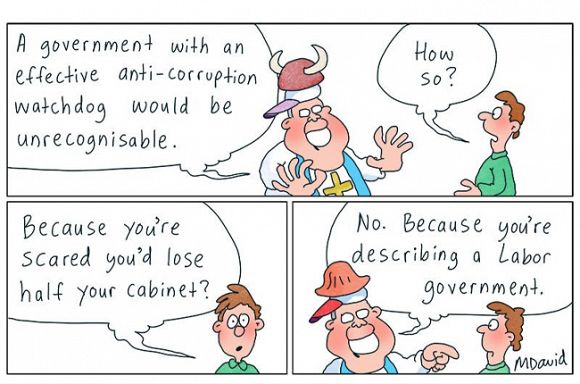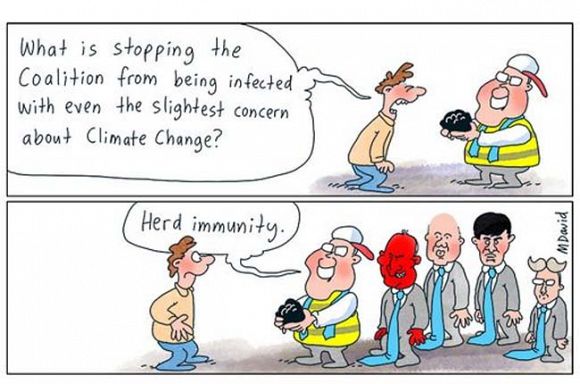The Morrison Government had escalated the fear of war and threat from China, but there are far more critical things to be afraid of, writes Dr Graeme McLeay.
SINCE POLITICIANS are fond of saying that they are “keeping you safe”, it is reasonable to ask, “From what?”
More often than not, what we should feel unsafe from is not defined. Implicit in the phrase is the idea that we should be frightened. Fear is a powerful force, but it tends to paralyse the mind and it is the enemy of reason. The immediate reaction is to retreat to old memes, such as fear of the other, the unknown, or simply a change. Fear resides in the limbic system of our brains, it is primitive, triggers our emotions, and is designed to “keep us safe”, but it is often inclined to error in our responses.
The appearance of a Chinese vessel off our shores and the decision by the Solomon Islands to sign a deal with China provided the Government with a perfect opportunity to hit the fear button. Our former Defence Minister advised us that we should “prepare for war”.
Indeed, we should be concerned about China’s intentions. The main game for China is surely Taiwan which it regards as indivisible from the mainland. However, a sober assessment of what that means for Australia is required, not knee-jerk reactions. There has been very little reasoned debate in Australia, in parliament, or in the print media about what China’s relationship with Australia means for our future.
What should we be frightened of? The concept of security cannot reasonably be confined to protection from a military threat. Security has a very different meaning for some of us. If you are a homeless person or a woman living out of her car, fleeing domestic violence; if you are an Aboriginal child living in a remote community, at risk of life-threatening, preventable rheumatic heart disease; if you are a Pacific Islander, the threat of losing your livelihood and, for some, your country. These are existential threats.
The extreme weather events of the last few years have shown Australia’s vulnerability to the climate crisis. How quickly most of us forget the droughts, fires, floods and searing heatwaves, while for many the stress of losing homes and livelihoods goes on for years, leaving a burden of mental and physical ill-health.
Climate change and the destruction of nature amplify and accelerate all other threats, including war. In a now-famous speech, the then governor of the Bank of England and now United Nations Climate Envoy on Climate Action and Finance, Mark Carney, spoke of the “tragedy of the horizon”. He was warning Lloyds of London about our inability to see a world just beyond the horizon, a world where climate change would impact every aspect of our lives and threaten our very existence.
In an open letter to Australia’s political leaders, members of the Australian Security Leaders Climate Group, led by Admiral Chris Barrie, wrote:
‘As ex-Service members and experienced security practitioners who have witnessed up-close the devastation of war and crisis, we consider that climate change now represents the greatest threat to the future and security of Australians.
“The first duty of government is to protect the people, but, on climate security risks, Australia is missing in action.’
The COVID-19 pandemic has been linked to habitat destruction and climate change which have been forcing many species into close contact with humans. When the pandemic struck, the Government turned to experts and the first year of the COVID nightmare was well managed.
Mistakes were made, but Australia had a better outcome than many countries, with fewer lives lost. Economic support was appropriate and well managed. Unfortunately, complacency has followed with high numbers infected, putting a drag on the economy and costing lives — over 5,000 so far this year. There is a cost to ignoring scientific evidence.
When it comes to climate change, a highly rated concern for a majority of Australians, leadership is thin on the ground. True, Greens Leader Adam Bandt has articulated the problem and some solutions, but climate change demands a bipartisan response from the major parties, removed from the influence of the fossil fuel lobby, science-based and looking to the future.
The rise of the Independents, and the “Voices of” movement may hold the key and the likes of MPs Zali Steggall, Helen Haines and other Independents give us reason to hope.
While there is no doubt that war is now more likely at a global level, fuelled by nationalism, militarism and distrust, our security will ultimately depend on how we manage climate change and care for the most vulnerable in our society, to build a stronger, more cohesive and peaceful nation. Arming ourselves to the teeth will not do it.
The Intergovernmental Panel on Climate Change Sixth Assessment Report was clear — despite attempts to water down the wording. Emissions must peak by the middle of this decade and then sharply decline. Mark Carney’s “horizon” is now at our feet. Will Australia be up to the challenge?
Dr Graeme McLeay is a retired anaesthetist and a member of Doctors for the Environment Australia.
Related Articles
- 'Don't Look Up' Election further ignores climate crisis
- Climate crisis worsened by population and economic growth
- Regenerative agriculture can save the planet and humankind
- UN warns Australia in danger of increased wildfires
- Billionaire activism reveals the failure of Australian democracy
 This work is licensed under a Creative Commons Attribution-NonCommercial-NoDerivs 3.0 Australia License
This work is licensed under a Creative Commons Attribution-NonCommercial-NoDerivs 3.0 Australia License
Support independent journalism Subscribe to IA.














